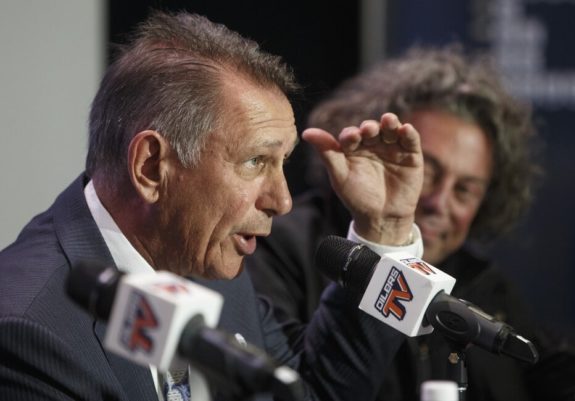Connor McDavid’s in-game theatrics proved once again why he’s unparalleled as a box office draw in the NHL. Leon Draisaitl built upon what’s already been a career year by registering 1.50 points per game with the fate of the Edmonton Oilers’ season hanging in the balance. Lastly, old reliable, Ryan Nugent-Hopkins, played his usual part in complementing Edmonton’s dynamic tandem admirably.
That doesn’t surprise or shock anyone, but neither did the team’s lack of secondary scoring or defensive intensity.
Edmonton showed the hockey world who they are. And, at the moment, that is an incomplete team. It’s hard to be subtle about this.
Related: How Much Do Players Get Paid in the Playoffs?
Now, warranted, the situation the Oilers were thrust into was unprecedented; however, the same applies to every single team invited to the NHL’s two “hub cities,” Edmonton and Toronto.
Maybe one could look at the Chicago Blackhawks, the dynasty of the last decade, and say a best-of-five qualifying series—after a prolonged break from play to the tune of four-plus months—favors them due to their seemingly endless playoff experience and composure that comes with it. That makes some sense, sure, but it’s nonetheless a little too easy and allows Edmonton off the hook.

Because though the qualifying rounds slighted the playoff-bound (under normal circumstances) Oilers to a certain extent, it wouldn’t have necessarily mattered if the product that was put on the ice resembled what we saw against Chicago for four games. This was the hand that Edmonton was dealt with, be it fair or not.
So…What Went Wrong?
Mike Smith starting in Game 1, which was a questionable decision at the moment, and immediately forfeiting four goals in the opening frame was not the way the Oilers wanted to start the series. Retrospectively, those who had reservations about head coach Dave Tippett’s decision to start Smith over Mikko Koskinen can feel justified—though that’s not much of a consolation prize. However, it’s difficult to exclusively blame Smith—outside of that first goal, which was just…yikes—as Edmonton’s defense didn’t do much to reduce the quality of shots their netminder was forced to endure in those first 20 minutes of action.
Speaking of their rather suspect defense, with roughly $10 million to spend and a variety of contracts that need addressing, general manager Ken Holland has some decisions to make. The team needs to adopt better defensive habits; be it through their current personnel or through the theatrics of offseason acquisitions to strengthen the team’s current porous defensive state.

The Oilers scored an average of 3.75 goals per game in the qualifying round, which is pretty good. It’s just that they also gave up an average of four goals per game as well, which isn’t great.
“Teams that win are the teams that defend,” McDavid said Friday, according to The Athletic’s Daniel Nugent-Bowman. “We haven’t figured that out yet.”
Edmonton’s power play produced three of their four goals in Game 1, their defense was suspect, and their overall five-on-five play left little to be desired. For better and for worse, the Oilers kind of showed you who they were in that opening game.
It Wasn’t All Bad, It Just Wasn’t Good Enough
The Oilers did a nice job of bouncing back and evening the series in the following contest, just to fall short in each of the next two. The games were tight, though the Hawks won three of four, they only outscored the Oilers by a single goal (16-15) for the series. With that said, it may sound as if I’m oversimplifying the issue, but good teams find ways to win tightly-contested hockey games.
Chicago capitalized in key moments; Dominik Kubalik scored the game-winner, breaking a 2-2 tie, with 11:30 left in the third period of Game 4. And it was Chicago, again, who scored twice late in the third period of Game 3, tying the game with a little less than six minutes left and then breaking that tie with 76 seconds remaining in regulation. If Edmonton wishes to be one of those teams – and they have the star power to back up such a wild claim – they have to find ways to win close games.

McDavid registered nine points, Nugent-Hopkins added eight, and Draisaitl tallied six points in the four games played against Chicago. The trio combined for a total of 23 points, while the rest of the team only combined for 13 points.
The Oilers did enjoy better secondary scoring this year compared to that of the previous season, but when it mattered the most, it disappeared – 10 of their 16 goals were generated from the aforementioned trio of McDavid, Draisaitl, and Nuge.
Related: Oilers’ Doug Weight Trade Revisited
Despite a disappointing and rather abrupt exit, it’s not all bad. Per Reid Wilkins of Global News, McDavid had the following to say regarding where the team is at moving forward:
“I’ll take where we’re at into this off-season as compared to last off-season,” McDavid said. “We’ve definitely made strides. We’ve definitely brought in pieces and have a little more stability, I think.”
Let’s hope that McDavid’s words ring true and the Oilers are able to build off their first winning campaign since the 2016-17 season.